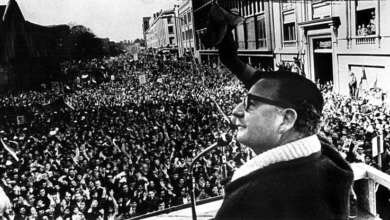Photo: TSE members meeting with officials from the U.S. embassy in Guatemala
Outrage has spread across Guatemala in the wake of the decision by the country’s Supreme Electoral Tribunal (TSE) to bar Thelma Cabrera and Jordan Rodas from registering in this year’s upcoming presidential election. They are representing Movimiento para la Liberación de los Pueblos and Comité de Desarrollo Campesino — MLP-CODECA.
In response to what could be described as an electoral coup, the Guatemalan people have engaged in sustained struggle. On Jan. 30, the Indigenous Ancestral Authorities held their national assembly where they demanded that the TSE accept the registration of Cabrera and Rodas within 15 days or the people will take to the streets.
In an interview with Liberation News, Carlos Barrientos, a leader in the Guatemalan social organization Comité de Unidad Campesina, expressed that inequality in the structure of Guatemalan society is reflected in the electoral registration process itself. He elaborated: “While the TSE blocks the registration of MLP over administrative reasons, they allow Suri Rios, the daughter of the former dictator Rios Montt, responsible for massacres and crimes against humanity, despite the fact that you cannot run for president if you’ve participated in coups, rebellions, etc. or if your parents have participated in such events within the constitution … There’s a clear inequality in how the TSE is handling this.”
Guatemala is no stranger to silent coups or the violence and repression that surround them. Speaking on the U.S.-led overthrow of the Jacobo Arbenz presidency that led to one of the bloodiest dictatorships in Latin America, historian Vijay Prashad once put it plainly: “the 1954 Guatemalan coup d’état, 11 days that didn’t shake the world as much as they ought to have.” The government of Guatemala was overthrown in a CIA operation to protect the profits of the United Fruit Company, now Chiquita, and U.S. hegemony on the continent.
To understand the current electoral coup, it’s necessary to understand what the ruling class of Guatemala fears: plurinationalism. Mario Lopez, a diasporic Guatemalan organizer in the United States, explained to Liberation News, “Plurinationalism refers to the socio-political movements composed primarily by the peasantry from the Indigenous nations across Latin America. In the case of Guatemala, the plurinational movement seeks to gain political power through its own political instrument, and create a plurinational state that recognizes and provides political, administrative, legislative, judicial, cultural, spiritual autonomy to the three Indigenous nations (Maya, Xinka, Garifuna) and Mestizo nation.”
Banning Cabrera and Rodas from the election is an anti-democratic, anti-poor, and anti-Indigenous attack by restricting the right of the people to vote for whoever they choose for president. The ruling class oligarchy in Guatemala, aligned with U.S. imperialism and beholden to its dictates, fundamentally fears a democratic society run by Indigenous peasants and workers. Guatemala has a population that is 60% Indigenous, perhaps the highest percentage in all of Latin America. This is the sector of society that has been leading the charge against electoral coup repression. They have the most to gain and have suffered the most losses.
In response to the call of the Indigenous Ancestral Authorities, a rally was held in front of the TSE on Feb. 2. A participant described the strength of resistance of the people in an interview to news media Plaza Publica, “If they do not [reverse the decision] we are going to take over the international airport, the 3 ports of the country, the Supreme Electoral Tribunal, and all state institutions. We are Indigenous, We are Maya and we can be out here for a month!”
On Feb. 4, the Council of the Maya People released a statement titled Fear of a Political Liberation Project, which read, “We call on all peoples to raise their heads and firmly denounce this injustice, because only the mobilized popular force will overthrow this criminal regime.”
On Feb. 16, the working peoples of Guatemala and Indigenous leaders kept their word. The popular strike took over, at minimum, eight major points throughout the national highway system, to which the government has chastised them for “an illegal strike that goes against the people’s rights.”
But the popular movement has not slowed down, and as of Feb. 21, the number of routes shut down by the protesters has jumped to 19. The ruling class in Guatemala is sacrificing an already suffering economy to protect their political supremacy, but the people refuse to accept this.






